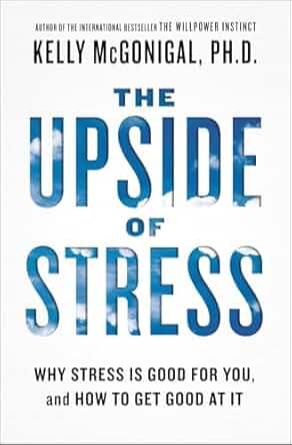Kelly McGonigal,PhD
“You can trust yourself to handle life’s challenges and you don’t have to face them alone.”
Influence on SDC Framework Focus
In her research on the “stress mindset,” Kelly McGonigal found that our perception of stress plays a powerful role in shaping well-being, a conclusion grounded in her focus on physiology and neurobiology. She has spent her career studying and teaching ways people can create better outcomes for themselves, work that has helped inform the development of the learning cycles in Self-Directed Change®.
McGonigal’s work underscores a key idea shared in SDC: how we relate to challenge shapes what becomes possible. Her research on stress, willpower, movement, and compassion reframes these experiences as pathways for growth, rather than treating challenges as problems to avoid.
Her “stress mindset” model shows that our beliefs about stress can matter as much as the stress itself. When we meet stress with awareness, including the recognition that it may be a signal to prepare, we activate more adaptive biological responses such as focus, resilience, and connection. As with SDC, this perspective does not bypass or downplay real difficulty. Instead, it invites a more constructive relationship with growth and change.
McGonigal also redefines self-control. Rather than seeing it as old-fashioned grit and willpower, she frames it as a trainable system grounded in physiology, values, and intentional practice. Compassion, movement, and connection are not just helpful; they are high-impact elements of a sustainable approach to change.
Where SDC emphasizes agency and pattern-recognition to support meaningful transition, McGonigal’s skillful academic approach offers SDC science-backed tools for building trust in one’s own capacity. The result is a shift from pressure and self-judgment toward self-partnership. McGonigal’s work affirms what SDC practitioners need to know: our ability to navigate change grows when we bring curiosity, connection to ourselves, and a willingness to stay engaged with our unique process.
For an even closer look, add Dr. McGonigal’s “The Upside of Stress” to your library today. Find it here in the ChangeWorks Bookstore.
Bookstore
Key Contributions and Concepts
Kelly McGonigal has revolutionized our understanding of psychological well-being by reframing stress as potentially positive rather than inherently harmful. She has conceptualized willpower as a trainable mind-body response rather than a fixed trait, developed structured approaches to cultivate compassion for self and others, and articulated the neurobiological foundations of how movement and social connection enhance resilience.
The Upside of Stress
Kelly McGonigal’s book The Upside of Stress and her viral TED talk: “How to Make Stress Your Friend,” challenge the belief that stress is inherently harmful. Around 2013, McGonigal began developing her positive stress mindset after reviewing a range of emerging research. A key influence was a 2012 University of Wisconsin study by Abiola Keller and colleagues, which followed nearly 30,000 adults over a decade. It found that individuals who experienced high stress but did not view it as harmful had the lowest mortality rates, highlighting the powerful role of stress perception on health and wellbeing.
McGonigal also drew on research from Harvard University, where studies showed that reframing stress responses (such as increased heart rate) as resources rather than threats leads to more adaptive cardiovascular patterns. When stress is interpreted as the body preparing for a challenge, not a signal of danger, people experience cardiovascular responses that more closely resemble courage or excitement, which are healthier for both mind and body.
Further supporting her perspective, McGonigal references research on stress and social connection, including a 2013 study funded by the National Institute on Aging and led by Michael Poulin. This work shows that stress prompts the release of oxytocin, the "cuddle hormone," which encourages people to seek connection and support, adding an important social dimension to how we experience stress.
This emerging understanding marks a significant shift in stress psychology: seeing stress not as an enemy to avoid, but as an ally that can enhance resilience, connection, and engagement with life’s challenges.
Importantly, McGonigal’s concept does not deny that stress can be difficult; rather, it reframes stress as a natural part of pursuing meaningful goals. The model distinguishes between the stressor itself and our perception of it, emphasizing that while external stressors may be unavoidable, how we interpret and respond to them is within our influence.
Critics caution that this framework may oversimplify the complex physiological effects of stress. While a positive stress mindset may help with acute stress, chronic stress still poses documented risks to various body systems, these are effects that mindset shifts alone cannot fully mitigate.
The Science of Willpower (The Willpower Instinct)
Kelly McGonigal defines willpower as “the ability to do what you really want to do when part of you really doesn't want to,” capturing the internal conflict between immediate desires and long-term goals. In The Willpower Instinct, she offers a science-based framework for understanding and strengthening self-control.
She presents willpower as a trainable mind-body response, not a fixed trait, with three components:
- “I will”—the ability to do what’s difficult,
- “I won’t”—the ability to resist temptation, and
- “I want”—awareness of long-term objectives.
These trainable responses rely on the prefrontal cortex, which must contend with older brain regions focused on instant gratification. McGonigal highlights how stress, sleep, nutrition, and physical activity influence this system, and thereby broadening willpower beyond sheer mental discipline.
She developed this model while teaching The Science of Willpower at Stanford, drawing on research from psychology, neuroscience, economics, medicine, and mindfulness studies. Meditation’s ability to enhance prefrontal activity shaped her emphasis on practical, accessible strategies for everyday life—bridging science with real-world application.
Critics note her framework may place too much weight on individual responsibility, overlooking systemic and biological factors, such as genetics and neurological differences, which also shape self-control capacity.
Compassion Cultivation Training
Compassion Cultivation Training (CCT), co-developed by Kelly McGonigal through the Stanford Center for Compassion and Altruism Research and Education, is a structured program designed to strengthen empathy, self-compassion, and social connection. It defines compassion as the awareness of suffering combined with the motivation to alleviate it.
CCT blends traditional contemplative practices with modern psychological science to systematically develop compassionate thoughts, emotions, and behaviors toward oneself and others. It distinguishes between empathy (feeling another’s emotions) and compassion (the desire to help), framing compassion as a skill that can be intentionally cultivated, not a fixed trait.
Unlike approaches that treat compassion as optional, CCT presents it as integral to psychological wellbeing, stress resilience, and healthy relationships. Self-compassion is emphasized as a more constructive alternative to self-criticism when facing setbacks.
The program draws from Tibetan Buddhist compassion practices (such as loving-kindness meditation), scientific research on altruism and empathy, and contemporary psychological approaches to emotional regulation. Its secular, evidence-based design makes compassion training broadly accessible across cultural and philosophical backgrounds.
CCT evolved through rigorous testing and refinement, resulting in a standardized eight-week curriculum now taught globally. However, challenges remain: sustaining compassion in high-stress environments can be difficult, and some question whether compassion can be meaningfully trained through structured programs, or whether these primarily reinforce tendencies in those already predisposed to compassion. Additionally, the eight-week format may limit accessibility for some individuals.
The Joy of Movement
Kelly McGonigal’s Joy of Movement framework reframes physical activity not as a duty or fitness goal, but as a powerful tool for psychological wellbeing, emotional regulation, and social connection.
Drawing on neuroscience and psychology, she shows how movement, whether structured exercise, dance, hiking, or gardening can trigger neurochemical effects that elevate mood, enhance cognition, and foster a sense of connection.
Her framework highlights mechanisms such as endocannabinoid release, endorphins ("hope molecules"), social bonding, and experiences of collective joy. Her work encourages people, especially those with negative associations toward exercise, to embrace movement for its immediate mood and connection benefits.
Kelly McGonigal has helped shift how we understand well-being by challenging long-held beliefs about stress, willpower, compassion, and movement. Through her work as a health psychologist, she offers practical ways to rethink how we relate to everyday challenges—and she backs those approaches with science.
Biography
Kelly McGonigal, born on October 21, 1977, is a health psychologist and lecturer at Stanford University known for her work in "science-help," which translates insights from psychology and neuroscience into practical strategies for health and well-being. McGonigal was raised in New Jersey where her parents, who taught public school, emphasized intellectual attainment. Her identical twin sister is the well-known game designer and author, Jane McGonigal.
McGonigal earned a B.A. in psychology and a B.S. in mass communication from Boston University, followed by a Ph.D. in psychology from Stanford University, where she is a lecturer. She teaches various programs at Stanford, including those at the Center for Compassion and Altruism Research and Education, the Graduate School of Business, and the School of Medicine’s Health Improvement Program. McGonigal has received Stanford University’s Walter J. Gores Award, the university's highest teaching honor.
Her work has profoundly influenced multiple disciplines, creating a remarkable bridge between scientific research and popular understanding of stress, willpower, and well-being. Her TED Talk "How to Make Stress Your Friend" has been viewed over 26 million times, fundamentally altering how millions approach stress management.
Before shifting her focus, McGonigal was the chief editor of the peer-reviewed International Journal of Yoga Therapy from 2005 to 2012 and advocated yoga and similar mindfulness practices as a way to re-charge and direct attention and mental resources so as to achieve desired outcomes. She is also a founding member of the Yoga Service Council and serves on the advisory boards of non-profit organizations that bring yoga and meditation to underserved populations.
Currently, McGonigal continues to impact the mental health community through her teaching, writing, and consulting work. She serves as a psychology consultant to The New York Times' Education Initiatives, helping educators interpret news through psychological science. McGonigal integrates her expertise in psychology with her passion for movement, teaching yoga and dance in addition to her academic work.
She is also an animal rescue advocate and volunteers as an adoption counselor for Best Friends Animal Society. In January 2020, Oprah Magazine named Kelly McGonigal the first-ever O! Visionary, celebrating her belief in human potential and her ability to transform scientific data into wisdom.
Helpful resources about Kelly McGonnigal and her contributions can be found at: https://kellymcgonigal.com/
Book Store
Yoga for Pain Relief: Simple Practices to Calm Your Mind and Heal Your Chronic Pain (2009; New Harbinger Publications)
- This guidebook provides instructions for meditation, breathing exercises, relaxation, and yoga sequences to transform pain, cultivate mindfulness and self-compassion, and create physical and emotional resilience.
The Willpower Instinct: How Self-Control Works, Why It Matters, and What You Can Do to Get More of It (2012; Avery Publishing Group)
- Based on McGonigal's Stanford University course, this book explains the science of self-control and how it can be harnessed to improve health, happiness, and success, combining prescriptive advice and complementary exercises.
The Neuroscience of Change: A Compassion-Based Program for Personal Transformation (2012; Sounds True)
- This audio program presents breakthrough ideas, guided practices, and real-world exercises for meaningful transformation, drawing on insights from neuroscience and psychology.
The Upside of Stress: Why Stress Is Good for You, and How to Get Good at It (2015; Avery Publishing Group)
- This book challenges long-held beliefs about stress and argues that stress can make individuals stronger, smarter, and happier if they learn how to embrace it, using life's challenges as a catalyst for positive action, personal growth, and compassion.
The Joy of Movement: How Exercise Helps Us Find Happiness, Hope, Connection, and Courage (2019; Avery Publishing Group)
- McGonigal combines science and storytelling to show how movement is intertwined with human joys like self-expression, social connection, and mastery, offering a powerful antidote to depression, anxiety, and loneliness.


